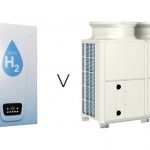7 Considerations before buying a Commercial Heat Pump
Commercial heat pumps offer an excellent low-carbon, renewable solution for heating and hot water in the UK. However, they may not be suitable for every situation. In this article, we highlight 7 reasons why you perhaps shouldn’t buy a commercial heat pump and to carefully assess your needs before opting for a heat pump and explore alternative considerations.
Electrical Supply:
In many buildings, a single-phase electrical supply is commonly installed to meet the demands of lighting and small power requirements. However, when considering the installation of heat pumps, particularly those with higher start currents, the need for a three-phase electrical supply becomes crucial. The substantial initial power draw during the startup of a heat pump is better accommodated by a three-phase system, ensuring smoother operation and preventing potential issues. While local electrical network distribution operators, such as UK Power Networks (UKPN), often offer the possibility of upgrading to three-phase power, there are instances where the necessary capacity is not available in a specific area. Moreover, the cost associated with upgrading to three-phase power can sometimes present a significant capital expense, rendering the installation of heat pumps financially challenging or even unfeasible for certain building owners. This underscores the importance of assessing both the electrical infrastructure and associated costs when considering the integration of heat pump systems into existing buildings.
Poor Insulation:
Insufficient insulation in a commercial-sized property poses a significant hindrance to the effective installation of a heat pump. Poor insulation results in increased heat loss and inefficiency, requiring the heat pump to work harder to maintain the desired temperature. This additional workload not only diminishes the overall performance of the heat pump but also escalates energy consumption, leading to higher operational costs. Inadequate insulation exacerbates temperature differentials, making it challenging for the heat pump to achieve optimal efficiency. Addressing insulation issues can be crucial for maximizing the benefits of a heat pump, enhancing energy efficiency, and ensuring a cost-effective and sustainable heating solution for the commercial property.
Upfront Cost:
Choosing a gas or oil boiler over a heat pump often comes down to the hefty upfront costs linked to heat pump setups. The initial price tag for a heat pump can be around five times more than that of a gas boiler. Even though heat pumps can be super efficient, up to four times more than gas boilers in favorable weather, the running costs paint a different picture. The thing is, gas is a lot cheaper than electricity. So, despite the efficiency, running a heat pump can end up costing about the same as running a gas boiler. This cost balance makes it tough to see any real savings or returns on your investment if you go for the supposedly greener heat pump option. In the short run, gas or oil boilers might be the wallet-friendlier choice for those looking to keep their upfront spending in check.
Noise Level:
The noise levels associated with heat pumps can be a significant drawback, potentially making them a less desirable choice for some homeowners. While advancements in technology have improved overall efficiency, some heat pump systems may still generate noticeable noise during operation. This can be a concern, particularly for those who prioritize a quiet living environment or have nearby neighbors. The audible hum or vibration produced by a heat pump may disrupt the tranquility of a home, making noise levels a crucial factor to consider when evaluating heating and cooling options.
Space Constraints:
Heat pump installers frequently encounter challenges related to limited space, especially in retrofitting scenarios. The installation of heat pumps, particularly ground-source or geothermal systems, may require ample space for components like ground loops or wells. In urban or densely populated areas, finding suitable space for these components can be challenging. Additionally, air-source heat pumps may need adequate outdoor space for optimal performance. Tight spaces, limited accessibility, or pre-existing structures can complicate the installation process and impact the efficiency of the heat pump system. Balancing the spatial requirements of heat pumps with the constraints of existing structures is a common consideration for installers, influencing the feasibility and success of heat pump installations.
Aesthetics:
Aesthetic concerns play a significant role in dissuading some individuals from choosing a heat pump for their homes. The size and appearance of heat pump units can be a particular issue, posing challenges for homeowners, especially in the context of historic or listed buildings. Finding a suitable and inconspicuous location for heat pumps can be particularly daunting, as their installation might clash with the visual harmony of the property. In listed buildings, where strict regulations often govern alterations to maintain historical integrity, the dilemma is intensified. Striking a balance between the functional necessity of a heat pump and preserving the visual appeal of a property becomes a key consideration for those mindful of the aesthetic impact on their homes.
Hot Water Requirements:
While advancements in heat pump technology and improved refrigerants have facilitated higher water temperatures, a significant number of heat pumps still typically provide lower flow temperatures, around 55 degrees Celsius. This poses a potential health and safety concern, especially in environments where preventing Legionella is crucial. The recommended minimum temperature for hot water cylinders to combat Legionella is 60 degrees Celsius. This disparity can be particularly challenging in healthcare properties, where higher water temperatures may be necessary. Despite these constraints, hybrid solutions and alternatives, such as incorporating electrical elements, can enable heat pump installations. However, careful consideration, especially in control system design, is essential to ensure both the efficacy of Legionella prevention measures and the overall functionality of the heat pump system in meeting specific property requirements.






